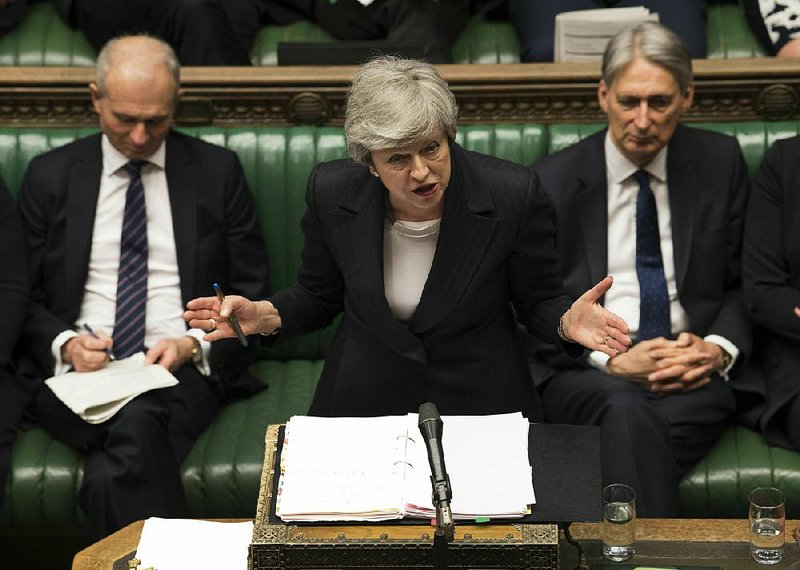LONDON -- British Prime Minister Theresa May dug in Wednesday against a push by rivals and former allies to remove her from office as her country struggles with its departure from the European Union.
May resisted calls to rip up her Brexit blueprint and end her premiership after her attempt at compromise was rejected by both her Conservative Party and opposition lawmakers.
Conservative lawmakers set up a Friday meeting with May, giving her less than 48 hours to announce her departure or face a renewed attempt to oust her.
Meanwhile, a senior Cabinet minister resigned with a letter criticizing May's failure to lead Britain out of the EU and hold her divided government together.
Andrea Leadsom, who served as leader of the House of Commons, alleged there had been "a complete breakdown of collective responsibility" in government. She said May's Brexit plan would not "deliver on the referendum result" that saw voters in 2016 opt to leave the EU.
Leadsom campaigned on the side of those who voted for leaving the EU, and she was seen as a strong pro-Brexit voice in the Cabinet.
Several other senior ministers were reportedly seeking meetings with May to express unhappiness with her Brexit plan. But her spokesman, James Slack, said he was "not aware of any discussions" with Cabinet colleagues.
Lawmaker Tom Tugendhat, a leading moderate in the Conservative Party, said the only chance of delivering an orderly Brexit was for May "to go -- and without delay."
"She must announce her resignation after Thursday's European elections. And the Conservative Party must fast track the leadership process to replace her," he wrote in the Financial Times.
In the House of Commons, May received a flurry of criticism and questions as she implored lawmakers to support a bill implementing Britain's departure from the EU. She plans to put the bill to a vote in Parliament in June.
Nearly three years after British voters opted to leave the EU, May said that "we need to see Brexit through, to honor the result of the referendum and to deliver the change the British people so clearly demanded."
If Parliament rejects her deal, she said, "all we have before us is division and deadlock."
Lawmakers have already voted three times to reject May's divorce deal with the 27 other EU countries, and Britain's long-scheduled departure date of March 29 passed with the country still in the bloc.
In a bid to secure support for her plan, May on Tuesday announced concessions that included a promise to give Parliament a vote on whether to hold a new referendum on Britain's EU membership -- something she had previously ruled out.
"I have compromised. Now I ask you to compromise, too," she said.
But there was little evidence that her plea was being heeded.
Pro-Brexit Conservatives accused May of capitulating to pro-EU demands, and lawmakers in the opposition Labor Party dismissed her offer as too little, too late.
"The rhetoric may have changed, but the deal has not," said Labor leader Jeremy Corbyn. "She did not seek a compromise until after she had missed her own deadline to leave, and by the time she finally did, she had lost the authority to deliver."
May's Conservative Party lost its parliamentary majority in a 2017 election. The party's anti-EU wing wants to oust May and replace her with a staunch Brexit supporter.
May has said she will announce a timetable for her departure once Parliament has voted on her Brexit bill.
She survived a no-confidence vote among Conservative lawmakers in December, keeping her safe from challenge for 12 months under party rules.
Pressure on May is likely to increase when results come in from this week's elections for the European Parliament. Many British voters on both sides of the Brexit debate could use the election to express displeasure over the political gridlock.
The election is being held today in Britain, but results won't be announced until after voting in all 28 EU countries wraps up late Sunday.
May insisted she would fight on. She said the Brexit bill would be published Friday so lawmakers can study it.
Her office said a vote will be held during the week of June 3.
"In time, another prime minister will be standing at this despatch box," May told lawmakers.
But, she told Parliament, "in the end our job in this House is to take decisions, not to duck them."
A Section on 05/23/2019
